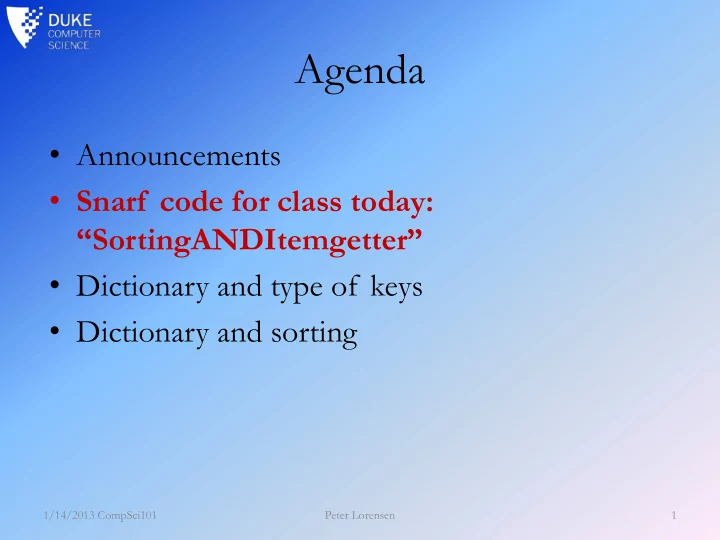

Agenda • Announcements • Snarf code for class today: “ SortingANDItemgetter ” • Dictionary and type of keys • Dictionary and sorting 1/14/2013 CompSci101 Peter Lorensen 1
Dictionary For loop using the following functions: .keys() Gives you all the keys in .values() the dictionary .items() Gives you all the values in the dictionary Gives you BOTH the keys and the values in the dictionary as a tuple 1/14/2013 CompSci101 Peter Lorensen 2
Dictionary What is printed by this code? dictPerson= {[ "Peter", "Lorensen"]: "919-659- 8462",["Owen","Astrachan"]:"919-985-3689" } dictPerson[[ "Susan", "Rodger"]] = dictPerson.get(["Susan", "Rodger"], "919- 867-3515") dictPerson[[ "Kate", "Moss"]] = dictPerson.get(["Peter", "Lorensen"], "919- 659-8462") print dictPerson.values() A: [ [ "Peter", "Lorensen"],["Owen", "Astrachan"], ["Susan", "Rodger"],["Kate", "Moss"] ] B: [ "919-659-8462", "919-985-3689", "919-867-3515", "919-659-8462"] C: Error D: [ "919-659-8462", "919-985-3689", "919-867-3515" ] 1/14/2013 CompSci101 Peter Lorensen 3
1/14/2013 CompSci101 Peter Lorensen 4
Mary Shaw • Software engineering and software architecture – Tools for constructing large software systems – Development is a small piece of total cost, maintenance is larger, depends on well- designed and developed techniques • Interested in computer science, programming, curricula, and canoeing, health-care costs • ACM Fellow, Alan Perlis Professor of Compsci at CMU • “Outstanding Research Award” winner from ACM SIGSOFT 1/14/2013 CompSci101 Peter Lorensen 5
Dictionary sort() ages = [18,14,27,23,12,31] print ages.sort() A: [12,14,18,23,27,31] B: None C: Error D: [31,27,23,18,14,12] 1/14/2013 CompSci101 Peter Lorensen 6
Dictionary sorted() ages = [18,14,27,23,12,31] print sorted( ages ) A: [12,14,18,23,27,31] B: None C: Error D: [31,27,23,18,14,12] 1/14/2013 CompSci101 Peter Lorensen 7
Sort( ) vs sorted( ) sort( ) sorted( ) In-place Return None Return list Function in list Built-in function Stable Stable Timsort Timsort 1/14/2013 CompSci101 Peter Lorensen 8
Sorting need • Given a list of tuples, sorted( sequence ) always uses the first item in the list to sort on: ages = [( "Bob", 37), ("Joe", 21), ("Linda", 27), ("Ant", 37)] print sorted( ages ) >>> [('Ant', 37), ('Bob', 37), ('Joe', 21), ('Linda', 27)] We often want to sort via the second (or third item) in a list of tuples. 1/14/2013 CompSci101 Peter Lorensen 9
def topsong(songd): '''songd is dictionary: key is email address corresponding value is list of song titles purchased by person with email address returns: song bought by most people''' mostDict = {} for songList in songd.values(): #songList=['IceBaby','Raise Glass'] for song in songList: #song = 'Ice Ice Baby' mostDict[song] = mostDict.get(song,0) + 1 # Adding new song if not there AND updating existing song at the same time """mostDict now contains this: mostDict = {'song1':3, 'song2':9, 'song3':2, 'song4':4, } halfList = mostDict.items() #[('Ice Ice Baby', 1), ('The Cave', 1), ('Raise Your Glass', 3), ('Landfill', 2), ('Sleepyhead', 1)] """TODO: Go through list of tuples, sort on the second item""" return halfList[0][0] #[('Raise Your Glass', 3), …..] 1/14/2013 CompSci101 Peter Lorensen 10
operator.itemgetter(…) sorted( list , key = func , reverse = True ) • sorted( ) takes 2 extra arguments. • func (key in documentation) is a function that is applied on every element. operator.itemgetter( itemNumber ) • The itemgetter( ) function simply gets the element number specified 1/14/2013 CompSci101 Peter Lorensen 11
Operator.itmegetter (…) example • You must import the operator to access the function .itemgetter(..) • The funtion is applied for each tuple and you simply specify which element you want import operator ages = [( "Bob", 37), ("Joe", 21), ("Linda", 27), ("Ant", 37)] print sorted( ages, key = operator.itemgetter(1) ) >>>[('Joe', 21), ('Linda', 27), ('Bob', 37), ('Ant', 37)] 1/14/2013 CompSci101 Peter Lorensen 12
Try the snarfed project 1/14/2013 CompSci101 Peter Lorensen 13
Operator.itemgetter (…) import operator employees = { "Li":("Sale", 1900.00), "Joe":("Sale", 2000.00), "Dale":("Transp",1950.00), "Lyn":("Sale", 2250.00), "Pete":("Transp",2150.00) } lstSort = sorted(employees.values(), key=operator.itemgetter(1), reverse=True) print lstSort[0][0] A: [( 'Sale', 2250.0), ('Transp', 2150.0), ('Sale', 2000.0), ('Transp', 1950.0), ('Sale', 1900.0)] B: 1900.00 C: [( 'Sale', 1900.0), ('Transp', 1950.0), ('Sale', 2000.0), ('Transp', 2150.0), ('Sale', 2250.0)] D: 2250.00 1/14/2013 CompSci101 Peter Lorensen 14
1/14/2013 CompSci101 Peter Lorensen 15
Recommend
More recommend